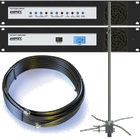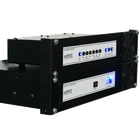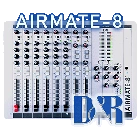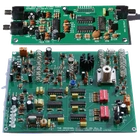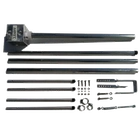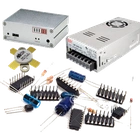User Manual and Installation of 5/8 Wave Antenna
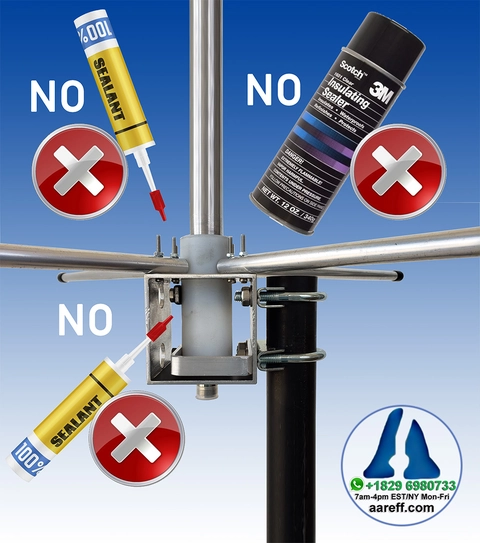
|
DON'T use additional sealant and sprays like resin and silicone. The bottom section is not just a physical mounting point, it is a precision capacitor, the flat sides are capacitor plates against the tube in the Teflon insulator. Additional resin and silicone change the dielectric constant, which detunes the antenna and causes reflected power |
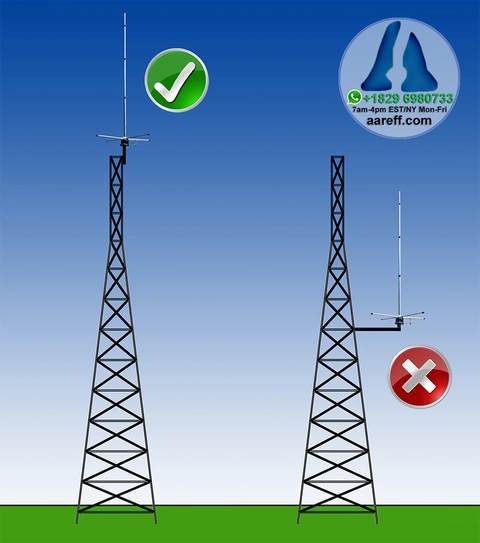
|
DON'T mount to the side of a tower, it should be mounted to the top of the tower. Side mounting on a tower will detune the antenna and cause reflected power. If you need to side mount, you should return the 5/8 antenna in new condition and exchange for one of our dipole type antennas, these are better suited for side mounting |
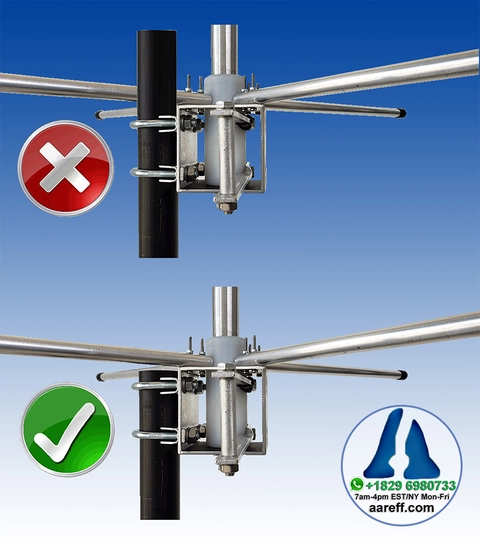
|
DON'T place the mounting pole higher than the four horizontal ground plane tubes. If the mounting pole is higher, it reduces the radiator aperture and there is also there is additional capacitance formed between the main radiator tube and the mounting pole held at ground. This additional capacitance detunes the antenna and causes reflected power. |
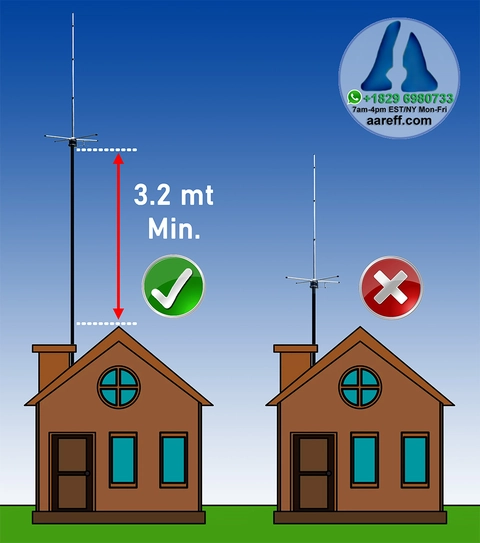
|
DON'T use a pole less than 3.2 mt. Most of the required ground reflection is provided by the four horizontal ground tubes, however, there is a residual amount of signal that relies on the main pole for reflection. If this is too short this signal is not reflected correctly and this detunes the antenna and causes reflected power |
 IMPORTANT!
IMPORTANT!
The antenna is the most important part of the transmission system and must be correctly installed before proceeding further and before any transmission equipment is connected.
Under no circumstances should the antenna be mounted and used at ground level or within a few meters of personnel.
Ideally this antenna should be mounted at least 20 meters high and clear of any surrounding objects to get maximum range and more importantly to reduce risk of radio frequency radiation to personnel. When mounted at least 20 meters in height off ground and using 1000 watts of transmitter power, power flux density measurements made at ground level directly under the antenna show less than 1 W/m2. Several European countries use a value for the power flux density of 10 W/m2 as a basis for considering whether or not an area is safe. The issue of radio frequency radiation limits is a contentious one and work in this field is continuing worldwide.
You are responsible for selecting the correct antenna for your application, installing it properly and ensuring the system maintenance.
INTENDED USE
This antenna is intended for use with an FM broadcasting transmitter up to 1000 watts at a permanently pre-defined location with a license or authorisation from the radio spectrum regulator of your country.
TO ERECT THIS ANTENNA YOU WILL NEED TO PROVIDE
| Antenna 50 ohm feeder cable, normally this is LMR400 |
| PVC insulation tape and/or Self Amalgamating Tape |
| Metric Tape Measure at least 3m |
| 13mm Spanner or Socket and Wrench |
| 10mm Socket and Wrench |
| Flat Screwdriver |
| Mounting mast or pole with a diameter of 38mm (1 1/12 inches) |
| Antenna 50 ohm feeder cable, normally this is LMR400 |
INSTALLATION NEAR TO POWER LINES
Following is a list of precautions to follow when installing the antenna if placement of antenna and cables is anywhere near power lines.
| Erect antenna on side of house or building as far away as possible from the power line. |
| Avoid crossing antenna cables under electrical power lines. |
| Do not attach antennas to towers, poles or similar structures carrying electrical power lines. |
| If you are not experienced in installation of antennas, have experienced persons assist you. |
| During installation, tie off antenna with rope so if it falls it can be diverted away from power lines. |
| Avoid fastening antennas, especially self-supporting types, to old chimneys or to any chimney not designed to take such stress. Forces created by a strong wind may be sufficient to topple both chimney and antenna. |
| Make sure antennas have been properly grounded and provided with other necessary lightning protection. |
PACKAGE CHECKLIST
| Qty | Item |
| 1 | A Main radiator tube 1”, mounting section and RF socket |
| 1 | B Main radiator tube 7/8” |
| 4 | E Ground plane tubes 1/2” |
| 8 | F M3 screws, washers and nuts (only 4 shown in picture) |
| 2 | G Mast fixing clamps (not shown in picture) |
| 3 | H Tube clips |
| 1 | I Tuning loop |
| 1 | J Tuning bar |
| 2 | K M6 screw and 2 washer |
| 1 | L M6 screw, 1 aluminium sleeve, 2 washers and 1 nut |
| The following tubes C and D are only included in the version delivered by the postal system | |
| 1 | C Main radiator tube 3/4” |
| 1 | D Main radiator tube 5/8” |
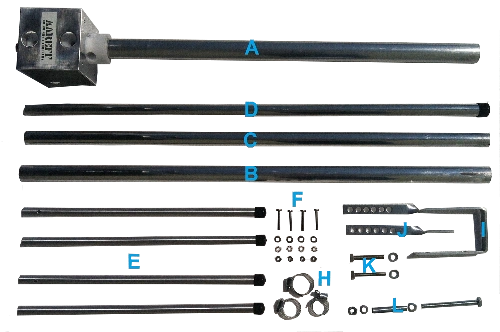
ASSEMBLING THE BASE
Using the following items assemble the base section with the tuning loop as shown in the picture below.
- Main radiator tube 1”, mounting section and RF socket
- Two mast fixing clamps
- Tuning loop
- Tuning bar
- Two M6 screws and washers
- M6 screw, aluminium sleeve, two washers and nut
The tuning loop, bar and aluminium sleeve form an half turn inductor. The operating frequency determines the position of the aluminium sleeve. Put the aluminium sleeve in one of the six positions shown in View of Base Assembly picture for the frequency that you want. This sleeve will be carrying a huge RF current, make sure it is tight and firm. The tuning loop and bar should also be screwed tight to the Teflon section with the two M6 screws and washers and also to the back plate using the mast fixing clamps. This is shown in the pictures.
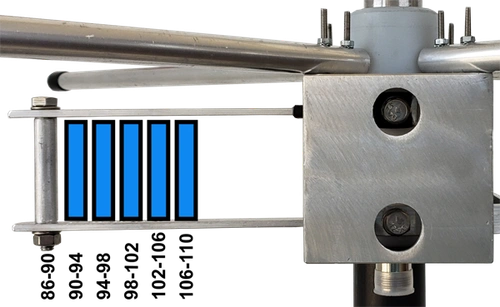
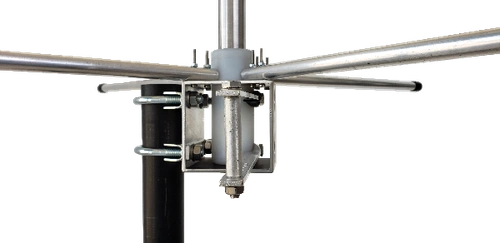
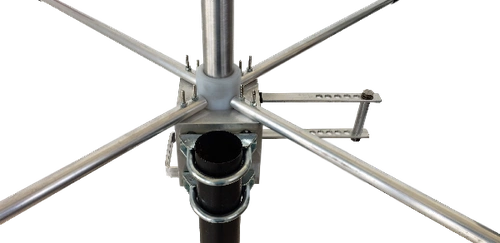
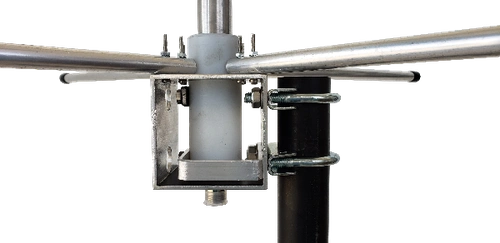
Fit the four ground plane tubes to the top plate of the base section and secure them tight with the four M4 screws and nuts.
ADJUSTING THE LENGTH
The operating frequency determines the length.
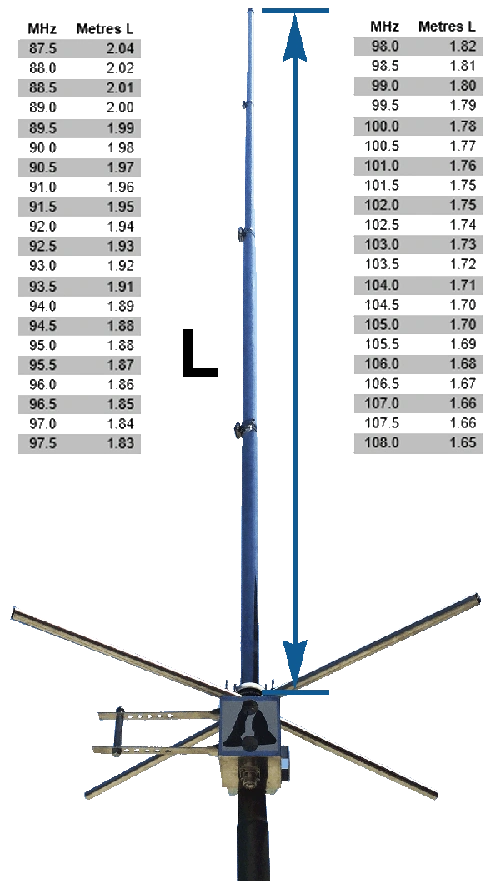
Pick the frequency (MHz) from the table that is the closest to frequency you need to use. For example if you needed 91.3 MHz, then you would pick 91.5 MHz, this is the closest. Then adjust the length of the antenna to the Metres shown for that frequency. Use a metric tape measure to measure the length from the (IMPORTANT) top plate of the base section to the end of the top tube.
Slide the tubes inside each other until the correct length is reached. At the correct length tighten the circular screw clips to secure the tubes in place. Make sure the clips are tight and the tubes don’t move. DOUBLE check the length again from the top plate of the base section to the end of the top tube. If this length is not correct, the antenna will not radiated correctly.
RADIATION PATTERN
Below is the radiation pattern for our 5/8 antenna showing a cross section of the signal between the antenna and the horizon at 0 and 180 degrees. Looking down from above at the 0 degree point the radiation pattern is perfectly circular.
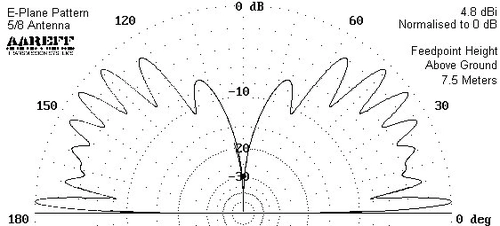
POWERING THE ANTENNA
 IMPORTANT!
IMPORTANT!
An incorrect antenna installation can cause RF burns and levels of RF exposure above the recommended limits for personnel.
Under NO CIRCUMSTANCES should the antenna be mounted and used at ground level or within a few meters of personnel
Ensure that all antenna connections to the transmitter or power amplifier are sound, this is important as poor connections and soldered joints can cause RF burns to personnel, severe noise to the transmission and excessive RF bandwidth.
If the antenna is installed and tuned correctly and you have an Antenna Analyzer, Network Analyzer or other SWR / Return Loss measuring equipment, you should expect to see results similar to our tests shown below.
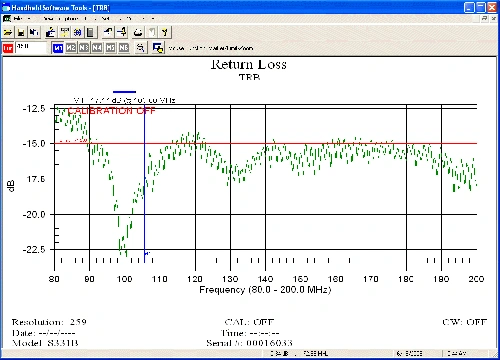
EM COMPATIBILITY
When writing this manual there was no EU directive regarding the EMC (Electro Magnetic Compatibility) of Band II VHF broadcast antennas, however in our view there are some potential EMC compatibility issues that need to be addressed when installing this antenna system. On completion of the antenna installation check;
1.All the cables entering the connectors are tight and properly crimped or soldered
2.All the connectors are screwed in tight and sound.
3.PVC insulation tape and/or self amalgamating tape are wrapped around all the connectors to stop water entering the connector and the inside of the body of the cable.
If any cables are loose or there are bad connections this can cause some non-linear resistance, diode action or some small arcing. When this happens it creates EMC disturbance (arcing and crackling sound) across a wide frequency spectrum.
TECHNICAL SPECIFICATION
| Antenna Gain (Isotropic) | +4.8 dBi |
| Frequency Range | 87 - 109 MHz |
| Bandwidth | +/-2 MHz for SWR of 1.5 SWR 1.1 Max at tuned frequency |
| Construction | Aluminium and Teflon |
| RF Connectors | N type, SO239 or 7-16 |
| Impedance | 50 ohm (1.1 SWR) unbalanced input |
| Polarisation | Vertical |
| Maximum RF Power | 1kW or 2kW |
| Weight of Antenna | 2 Kg |
| Wind Speed Handling | 90 MPH Minimum |
MAINTENANCE
Because antennas are passive devices maintenance requirements are low, however don’t accept low as being none existent, some periodic inspections are required.
Always following a heavy storm or extreme weather condition an inspection should be done and as shown in the table below.
| WEEKS | Building Roof | Light Duty Tower | Heavy Duty Tower |
| 13 |  |
||
| 26 |  |
 |
|
| 39 |  |
||
| 52 |  |
 |
 |
LEGAL ADVICE
We sell this equipment to professionals and organizations in good faith it will be used correctly and legally. Most countries in the world require licensing for this antenna to be used with a transmitter. It is the customer’s responsibility to check relevant laws, directives, regulations and licensing requirements before putting this product into service with an antenna system. You, the customer or user agree to defend, indemnify and hold harmless Aareff Systems Limited, its employees and agents, from and against any claims, actions or demands, including without limitation legal and accounting fees, alleging or resulting from improper or unlawful use of this equipment.
© 2019 AAREFF SYSTEMS LIMITED
ALL RIGHTS RESERVED. Aareff is a trademark of Aareff Transmission Systems. All contents of this document including, but not limited to the images, logos, text, illustrations are protected by copyrights, trademarks and other intellectual property rights which are owned and controlled by Aareff Transmission Systems or by other parties that have licensed their material to Aareff Transmission Systems. This document in part or whole may not be copied, reproduced, republished, uploaded, posted or distributed in any way, including by e-mail, ftp or any other electronic means
Every care has been taken in the preparation of this document, errors in content, typographical or otherwise, may have occurred. If you have comments concerning its accuracy, please contact Aareff Systems Limited (UK)

 +1 829 698 0733
What Do You Need? Talk To Us
+1 829 698 0733
What Do You Need? Talk To Us
